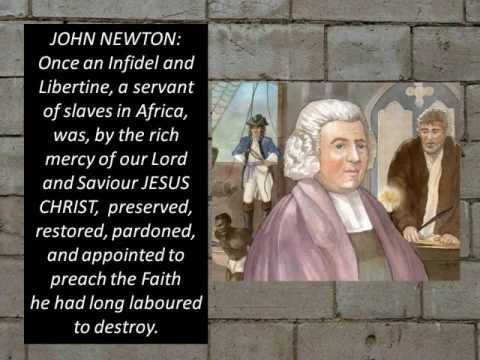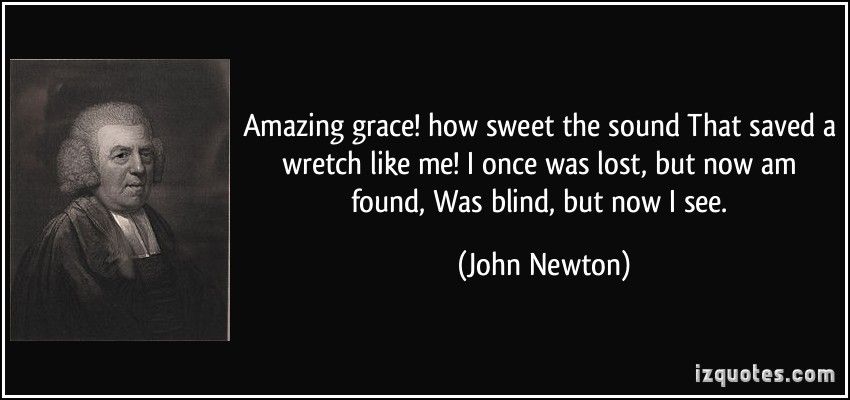POINT #1
THE PRICE OF FREEDOM
IS PERSONAL SACRIFICE
POINT #2
THE PRICE OF FREEDOM
IS PERPETUAL VIGILANCE:
POINT #3
THE PRICE OF FREEDOM
IS PERSONAL RESTRAINT:
During the “American Revolution” there was a man preaching across the pond in London named John Newton who had experienced that revival of heart, that ultimate freedom that only comes from Jesus Christ. His father was a well-respected sea captain and his mother was a faithful Christian woman. She often told her son the stories of her faith as he fell asleep at night. Unfortunately, she died when Newton was only eight years old, so as he moved into adulthood the stories of Jesus became a distant memory of his mother. Newton followed in his father’s footsteps as a sailor; well he was really forced into life on a boat when in 1744 a war was declared with France. He was one of eight young men who received letters from Britain informing them that they were to report to the Royal Navy because of their knowledge of life at sea. It was on this ship that he had long discussions with a mate who was a passionate atheist. One summer night he threw his mother’s faith overboard and became an adamant atheist himself. Looking back on that night he recalled experiencing a feeling of “rejoice… that I now might abandoned as I pleased, without any control.” Controlling his life is exactly what he did, he really didn’t like the fact that he was forced to join the “Royal Navy” and on two occasions he tried to flee the ship. Both times he was brought midship and flogged with a cat of nine tails for all to see. Eventually he left the Royal Navy and joined a slave trade ship, where he would travel up the Africa cost and barter for black slaves. All slaves that entered the boat would be branded and put in irons. A third of those slaves were women who were then divided up among the men on the ship to live out their sinful desires. John Newton let lust run unchecked!
Freedom isn’t free, it always cost a price and it normally is life!
Slavery, while slavery to sin on the other hand appears free, it will cost you everything. John Newton reflects on that time and said, “Slave trade effaced the moral sense, robbed the heart of every gentle and humane disposition and hardened it like steel.”
It was a cold night in January 1748 when Newton was on the Greyhound shipping cargo in the North Atlantic. The atheist, he retired for the night into the bunks below deck to do some reading. John was reading “The Imitation of Christ” Newton read it with detachment as if it were a romance novel. That day he read the words,
“Today the man is vigorous, and gay, and flourishing and tomorrow he is cut down, withered and gone… Ah, wretched guilty creature! Ah, stupid unthinking sinner! How wilt thou appear at the tribulation, or what plea can thou urge at the bar of sentence, to him who needs no evidence but is himself privy to thy most concealed impieties? Does thou know this and yet go unconcerned, how shalt thou escape the terrors of that dreadful day?”
At first Newton felt adventurous about the whole thing, and would yell out, “in a few days we will set over a glass of wine and talk about this.” hours tuned into days and in uttermost tiredness he went to offer a suggestion to the caption, the caption excepted his suggestion then as Newton turned away the caption said, “If this will not do, then the Lord have mercy on us!”
Well those words ring in his heart, “Have Mercy on Me, Have mercy on Me, the chief atheist, the loudest swearer and the man who mocked God’s existence. What mercy can there be for me?”
He was stationed at the wheel for the remaining journey to land, only given a few breaks to take rest. It was his time at the wheel; that the verses that his mother had shared with him, which had been stored in his heart-- fluttered to his head. He recalled Jesus life, His death and resurrection. How He forgives sin! Could he really forgive sin, especially a sinner like him, for he was an atheist, he had cursed God and those who followed him, he had abused woman and men in his time as a slave trader, there was truly not a greater sinner he thought.
Newton had discovered that his heart was incased in steal, and that he had become a captive to sin, what he once had sought as freedom had in- slaved him. Just as years ago he had thrown his mother’s faith overboard, the Lord tossed those chains which bound his heart and set him free; a freedom in which he would never forge! Remember Freedom is not free it always cost something, and normally it is life! It was the Life of Jesus Christ which many years before Newton had even enslaved his heart to sin that allowed the freedom that he experienced. John Newton became one of the most influential pastors in the late 17th Century. He is well know for writing the song “Amazing Grace”



 RSS Feed
RSS Feed